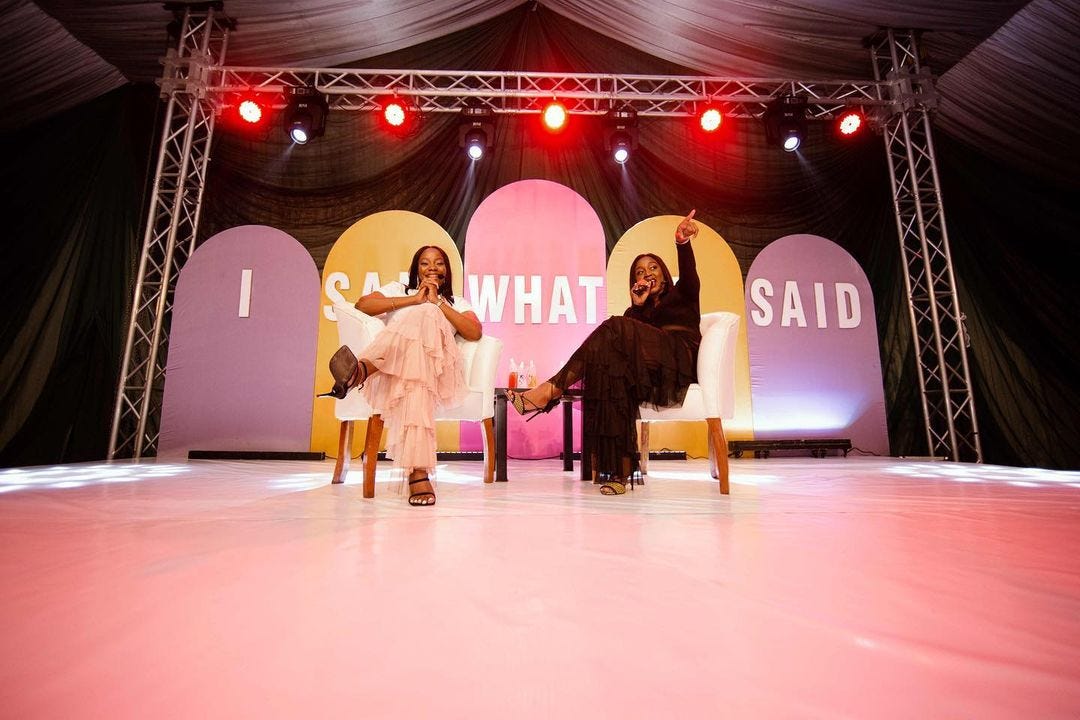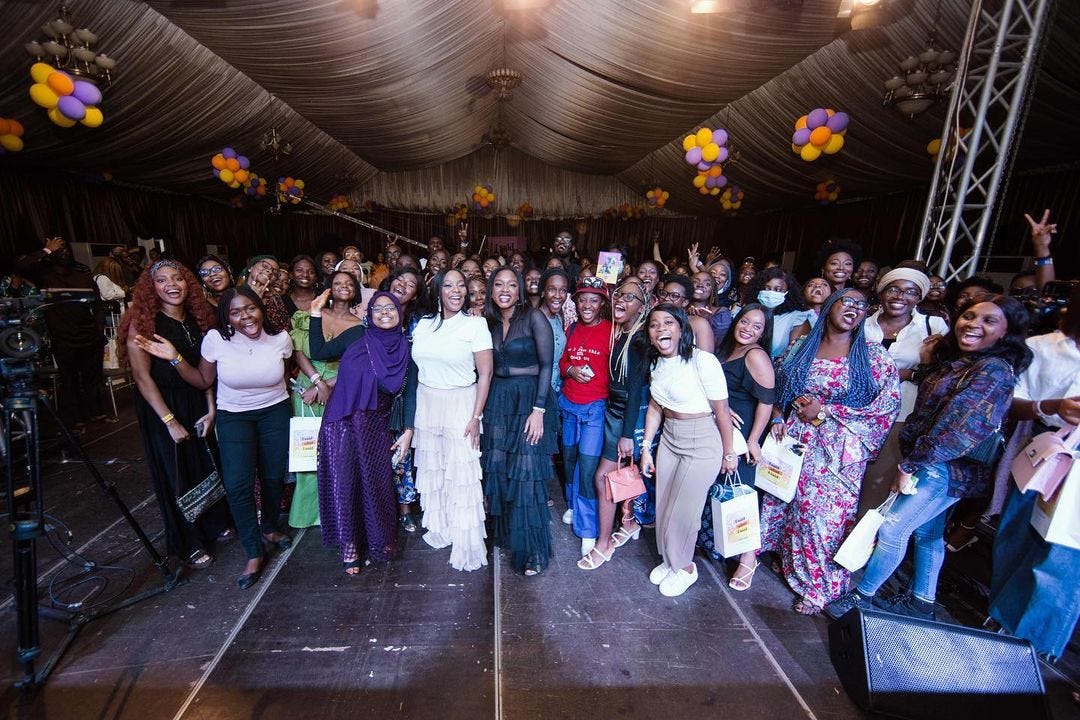Communiqué 21: How two women built one of Africa’s biggest podcasts
Here’s how Jola Ayeye and Feyikemi FK Abudu set “I Said What I Said” up for success.

When Jola Ayeye and Feyikemi Abudu conceived “I Said What I Said” (ISWIS) in 2017, they were particular about what they wanted to create: a podcast laced with humour, its finger firmly on the pulse of youth and pop culture, and a platform that freed them up to talk about anything.
They wanted to host their show without worrying about technicalities. And so began their search for a partner with the resources: a studio, recording equipment, engineers, and editors. The search led them to Midas Radio, a podcast network under Aristokrat Records.
Along with the network, Ayeye and Abudu planned to experiment with four episodes. However, their already significant social media following ensured their first episode got thousands of listeners. (It currently has over 9,000 plays on Soundcloud).
In February 2020, during Social Media Week Lagos, Ayeye and Abudu hosted their first live event, and their listeners got to see them perform live. They joked and laughed and talked about many things. They’d mastered mixing the mundane with the imaginative, the facile with the reflective. The live audience consisted of 40-odd people, and the podcast at the time had over 200,000 listens, a remarkable achievement for such a nascent medium.
A little more than a year later, in August 2021, ISWIS hosted its first paid live event, and it sold out with hundreds of people in attendance. In September, the show moved to Abuja and sold out again. In October, it sold out The Fitzgerald in Accra, Ghana.
A few months later, in December, the hosts put together a party for their community, complete with an attire that doubled as the ticket (each one cost N15,000, about $27). With hundreds of people eating, drinking, laughing, and playing games, there was very little indication they were there because of a podcast. If you didn’t know better, you’d think it was a Yoruba wedding ceremony.
By the end of 2021, the podcast had attracted close to 2 million listens. That was also the year the team incorporated video, something the hosts were initially reluctant to do, but that mushroomed their audience.
The “I Said What I Said” recipe for success
The ‘Òwámbẹ’ (a Yoruba term used to describe elaborate parties and ceremonies) ISWIS hosted in December 2021 was sponsored by big brands like Schweppes, The Singleton, and Flutterwave, substantiating just how far the podcast had come.
What started as an experiment between two friends had grown into one of Africa’s biggest podcasts, complete with a variegated business model.
But how did it grow this big? How did the team set their podcast up for success?
1. The hosts’ chemistry
Foundational to this podcast’s success is the chemistry between Ayeye and Abudu. Listening to them, you get the feeling that two close friends are letting you into their inner circle and sharing their most candid thoughts. Nothing feels forced, and there’s no topic too sacred to explore.
Hope Michaels, a listener, describes it this way:
“It’s like having a conversation with your girls. The discussions they have aren’t what you’d normally think you need to hear about until you hear about them. It’s light and airy and doesn’t feel like they’re trying so hard to be deep and impactful.”
2. A ready-made audience
It’s more difficult to get people to pay attention to your content if you don’t already have a significant audience or social capital. For Ayeye and Abudu, the odds were in their favour. They already were active on social media, particularly on Twitter, with many followers interested in what they had to say. The harder part was getting the content and delivery right.
3. The content and delivery
Perhaps the biggest appeal of this podcast is what the hosts choose to talk about and how they talk about it. They’ve mastered the art of conversation. Friendly conversation. They know how to use humour and make it stick, regardless of the subject.
Take this October 2020 episode, for example. It’s dedicated to discussing the Lekki Toll Gate Massacre and its aftermath. By every measure, it’s a grim topic. But Ayeye and Abudu masterfully explore it without losing an ounce of their humour and lightheartedness. They use relatable stories and personal experiences to draw their listeners in and then round off with simple steps to help move things forward.
They spice up their ability to select and navigate topics with their eye for guests. They know which guests to invite to the show, which questions to ask, and what direction to steer the conversation. Their dexterity is reminiscent of some of the greatest talk show hosts you’ll ever listen to.
4. Incorporating video
In 2021, ISWIS moved from Midas Radio to Eggcorn Digital, and it was at this point the team began playing with the idea of making video podcasts, but there was initial resistance.
“We didn’t think people wanted to see that. We weren’t sure what the value add would be and what the growth would look like,” Ayeye tells me. Incorporating video was a whole new ball game.
Eventually, the consensus was to experiment with one video episode and make decisions based on its performance. Like most of their other experiments, this one did well, and they haven’t looked back since.
Ayeye also confirmed that adding video to the mix helped the podcast grow exponentially. “There’s a whole new segment of our audience that doesn’t even know we have an audio podcast. They think it’s just video,” Ayeye says.
(Aside: She asked me to tell anyone reading this who listens to or watches the podcast to ‘like’ it so that more people can see it. In her words, “It’s no longer fun and games.” Now, back to our regularly scheduled programme.)
How ISWIS monetises content and community
Very rarely do podcasts make money in Africa. They are often long-running or short-lived passion projects. Or they exist as brand-building mediums, a means to a more profitable end.
ISWIS is an exception. The podcast already generates revenue from its content and the community. How?
1. Sponsorships and collaborations
Sponsorships and collaborations are the lowest hanging fruit for monetising content, and ISWIS has capitalised on its popularity. Because the podcast strongly appeals to young people, it’s become a major attraction for companies looking to reach that demographic.
The podcast often mentions these sponsors and their products. For example, it hosted a raffle draw from December 7th to 22nd, 2021, as part of its “12 Days of Christmas” series. Each day came with a new episode sponsored by different companies. The raffle draw winners got flight tickets, gaming consoles, vacation packages, food, shopping vouchers, and so on.
2. Paid live events
ISWIS leveraged its brand and community to create live versions of the podcast in three major African cities — Lagos, Abuja, and Accra. All of these events were ticketed but also sponsored.
The hosts recognised that they’d built a loyal following that could pay to see them do what do they do on their podcast physically. But beyond recording live podcasts, they also got the chance to forge deeper connections with their listeners in person.
3. Merchandising
Everyone who’s ever attended a live ISWIS event will have seen the merch stand. By customising items like mugs, pop sockets, t-shirts, and keyrings, ISWIS creates a way for its brand to stay in its followers’ hearts while generating revenue in the process.
Looking into the future
What does the future look like for “I Said What I Said”? Are there any plans to get acquired, or will it remain independent? There are no specific answers to these questions.
“Plan is a very strong word,” Ayeye says. “Our independence gives us many options. We’re not constrained or forced to do anything, much like artists who choose to remain independent or go corporate.”
Any talk of acquisition must be seen through the lenses of the hosts and their podcast’s relationship with the audience, the benefits of the said acquisition, and the new dynamics it’ll introduce to their operations. “Considering what we’re learning about the podcast, the options we have, how we can do things, whom we can decide to work with, it will need to make a lot of sense,” she says.
It took three years before the podcast began generating revenue, and Ayeye calls it “an honour” to be able to make money from something she enjoys.
However, if there were to be talks of an acquisition, what matters would be the options, how they’re presented, and what they allow them to do for the podcast, the community they have, and the community they’re building.




I’m just reading this in 2025 lol
I wonder what they’ll have to say now
There’s a massive difference.
Insightful as always. Thanks, David.